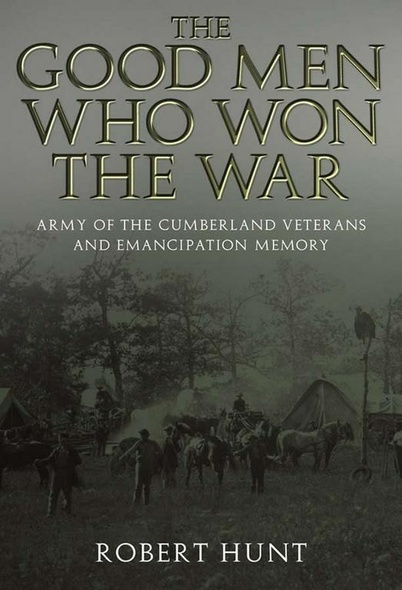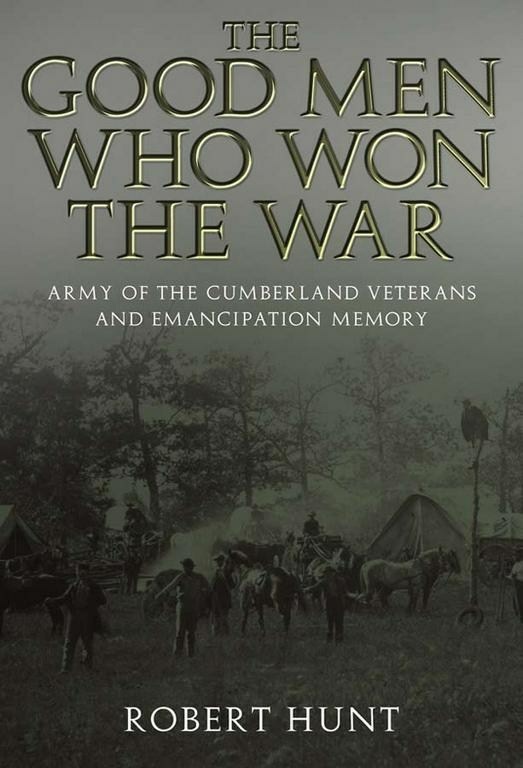The Good Men Who Won the War
Army of the Cumberland Veterans and Emancipation Memory
University of Alabama Press
Examines how Union veterans of the Army of the Cumberland employed the extinction of slavery in the trans-Appalachian South in their memory of the Civil War
Robert Hunt examines how Union veterans of the Army of the Cumberland employed the extinction of slavery in the trans-Appalachian South in their memory of the Civil War. Hunt argues that rather than ignoring or belittling emancipation, it became central to veterans’ retrospective understanding of what the war, and their service in it, was all about. The Army of the Cumberland is particularly useful as a subject for this examination because it invaded the South deeply, encountering numerous ex-slaves as fugitives, refugees, laborers on military projects, and new recruits. At the same time, the Cumberlanders were mostly Illinoisans, Ohioans, Indianans, and, significantly, Kentucky Unionists, all from areas suspicious of abolition before the war.
Hunt argues that the collapse of slavery in the trans-Appalachian theater of the Civil War can be usefully understood by exploring the post-war memories of this group of Union veterans. He contends that rather than remembering the war as a crusade against the evils of slavery, the veterans of the Army of the Cumberland saw the end of slavery as a by-product of the necessary defeat of the planter aristocracy that had sundered the Union; a good and necessary outcome, but not necessarily an assertion of equality between the races.
Some of the most provocative discussions about the Civil War in current scholarship are concerned with how memory of the war was used by both the North and the South in Reconstruction, redeemer politics, the imposition of segregation, and the Spanish-American War. This work demonstrates that both the collapse of slavery and the economic and social post-War experience convinced these veterans that they had participated in the construction of the United States as a world power, built on the victory won against corrupt Southern plutocrats who had impeded the rightful development of the country.
Robert Hunt examines how Union veterans of the Army of the Cumberland employed the extinction of slavery in the trans-Appalachian South in their memory of the Civil War. Hunt argues that rather than ignoring or belittling emancipation, it became central to veterans’ retrospective understanding of what the war, and their service in it, was all about. The Army of the Cumberland is particularly useful as a subject for this examination because it invaded the South deeply, encountering numerous ex-slaves as fugitives, refugees, laborers on military projects, and new recruits. At the same time, the Cumberlanders were mostly Illinoisans, Ohioans, Indianans, and, significantly, Kentucky Unionists, all from areas suspicious of abolition before the war.
Hunt argues that the collapse of slavery in the trans-Appalachian theater of the Civil War can be usefully understood by exploring the post-war memories of this group of Union veterans. He contends that rather than remembering the war as a crusade against the evils of slavery, the veterans of the Army of the Cumberland saw the end of slavery as a by-product of the necessary defeat of the planter aristocracy that had sundered the Union; a good and necessary outcome, but not necessarily an assertion of equality between the races.
Some of the most provocative discussions about the Civil War in current scholarship are concerned with how memory of the war was used by both the North and the South in Reconstruction, redeemer politics, the imposition of segregation, and the Spanish-American War. This work demonstrates that both the collapse of slavery and the economic and social post-War experience convinced these veterans that they had participated in the construction of the United States as a world power, built on the victory won against corrupt Southern plutocrats who had impeded the rightful development of the country.
Hunt’s [book] is a relatively trim and tidy study, but it certainly packs a punch. . . . It utilizes the personal memoirs of Army of the Cumberland veterans alongside their regimental histories ‘to evaluate how the authors included emancipation in their interpretation of the North’s victory in the Civil War.’ The choice of the Army of the Cumberland as the lens through which to refract the multitude of memories and the meanings applied by and to them is an excellent one. . . . the Army of the Cumberland comprised such a broad mix of backgrounds in its soldiery, and operated in an area that received, at best, mixed messages about what the war was about, as to render the perspectives of its veterans especially valuable for historians. Hunt's is such a marvelous and supremely well-crafted study; persuasive and provocative in equal measure. He succeeds in drawing out these men of the Army of the Cumberland not just from the battlefields they fought on, but from the historiographical battlefield that they now find themselves in. It is an excellent example of the many ways that America's Civil War past is inflected in its present, and the epitome of historical analysis at its best.’
—Journal of the Civil War Era
In this small gem of a book, Robert Hunt makes a remarkable and worthy contribution to this literature, examining how veterans of the Army of the Cumberland depicted and explained their experiences in postwar writings.’
—Blue Gray Magazine
This work represents a welcome addition to the field of Civil War memory, specifically as a work on white Union veteran memory. Hunt’s work is adept at highlighting the importance of place and experience in crafting a unique memory of the war.’
—Southern Historian
Robert Hunt is a Professor in the Department of History at Middle Tennessee State University.





